Balanced Diet – Nutrients and Deficiency Diseases
A diet which comprises adequate amounts of necessary nutrients required for the healthy growth and development of our body. A balanced diet includes both sufficient and nutritious food to ensure good health.
A normal balanced diet contains a sufficient amount of fibre and the other nutrients provide the appropriate amount of energy and adequate amounts of water.
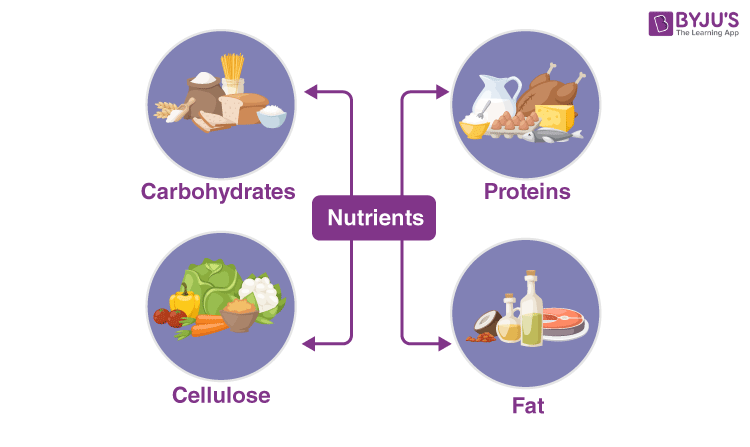
Importance and Objectives of Maintaining a Balanced Diet
A balanced diet covers different food types in the right amounts to stay healthy. It is essential for a healthy body and a healthy mind. Just eating a single food would not provide all essential nutrients. As per the nutritionist’s advice, a normal balanced diet is essential for maintaining good health and sensible body weight. Improper diet results in poor development of a body with malnourishment and overeatingleads to weight, diabetes, obesity and other diet-related diseases.
The main objectives of the balanced diet include:
- For a healthy weight and energy balance.
- To provide essential nutrients required for proper functioning and maintenance of cells, tissues, and organs of our body.
- Limited consumption of saturated fats, processed foods, junk foods, simple sugar, iodized salt, sodium, etc.
- Include a high amount of fruits, vegetables, legumes, nuts and whole grains.
- To avoid malnourishment and other nutritional deficiency diseases.
According to the Department of Nutrition and Food Science, nutrients are divided into two groups:
Micronutrients – Carbohydrates, fats, and proteins are classified as micronutrients
Macronutrients –Vitamins (A, B, C, D, E, and K) Water and other minerals – calcium, phosphorus, magnesium, selenium, zinc, etc. are classified as macronutrients.
Both nutrients are important for the overall good health. An imbalanced diet may either lead to the excess or inadequate intake of a nutrient. Insufficient intake of a particular nutrient leads to certain deficiency diseases.
Let’s have a glance at each nutrient in detail.
Carbohydrates
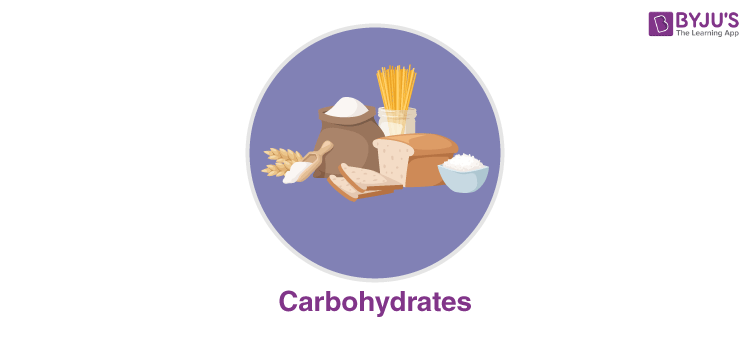
Carbohydrates are a vital source of nutrients which provide energy for our body. Glucose/blood sugar produced by converting carbohydrates is utilized as a source of energy for the cells, tissues, and tissues organs.
- Sources of carbohydrates: cereal, grains, potatoes, processed cheese, corn, beans, lentils, peanuts, peas, whole-grain bread, pasta, milk, refined sugars like candy, and carbonated beverages like soda, syrups, and other dairy products.
- The function of carbohydrates: The main function of carbohydrates is to deliver energy and is also involved in fat metabolism and the breakdown of proteins for energy.
- Deficiency diseases of carbohydrates: This results in hypoglycemia, ketosis, tiredness, decreased energy levels, unhealthy weight loss, low sodium level, etc.
Fats
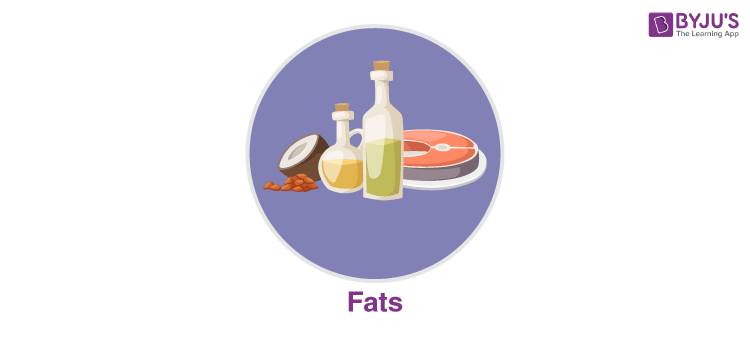
Fats are considered as the most concentrated source of energy. Fats belong to a group of elements called lipids. There are two types of fats – saturated fats (bad fats) and unsaturated fats (good fats).
- Sources of fats: Almonds, ghee, red meat, fish, cheese, butter, walnuts, cream, oils including coconut, rice bran, mustard soya bean and ground nut
- The function of fats: They are mainly involved in the transportation of vitamins and also they act as insulators by protecting vital organs like the heart, liver, kidney, etc.
- Deficiency diseases of fats: There are no such deficiency diseases other than skin and nervous disorders.
Proteins
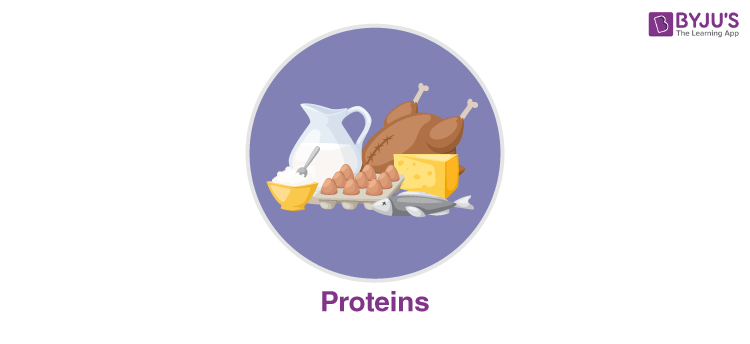
They are the building blocks of our body as they provide metabolism and strength to our body. Proteins are large biomolecules involved in functioning and regulating our body cells, tissues and organs. They are made of smaller units of amino acids.
- Sources of proteins: almonds, eggs, chicken, fish, seafood, beans, soya, pulses, cottage cheese, yoghurt, broccoli, milk and other dairy products.
- The function of proteins: Proteins are the major source of energy which is mainly used for body movements. They are mainly involved in producing enzymes, hormones, creating DNA molecules and other metabolic chemicals. Proteins also play a key role in boosting our immunity, building muscles, cell communication, digestion and production of Keratin (required for hairs and nails).
- Deficiency diseases of proteins: This results in kwashiorkor, weight loss, marasmus, etc.
Vitamins
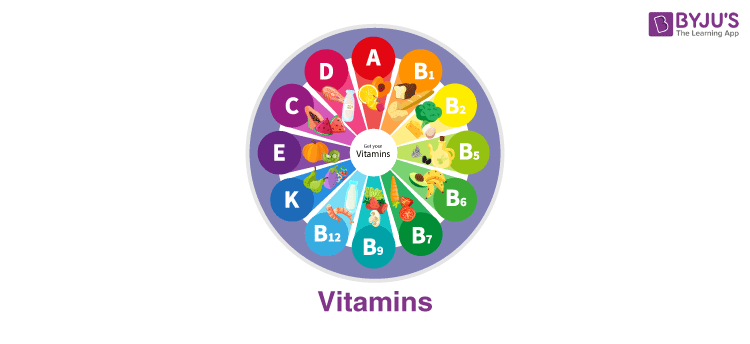
Vitamins are organic compounds which help in performing the biological functions of a living organism. It is a vital nutrient that should be included in our daily diet in a required quantity. Vitamins are categorized into two types based on their solubility.
Fat-soluble (A, D, E, and K) and Water soluble Vitamin (C and B)
- Sources of vitamins: milk, cheese, egg, liver, red meat, poultry, fish oils, green leafy vegetables, dark-coloured fruits and vegetables, vegetable oils, cereals and pulses, peanuts, lentils and other legumes.
- The function of vitamins: Vitamins are very much essential for maintaining proper vision, growth, a healthy immune system, and healthy skin, bones, teeth, and gum. It is also involved in the proper functioning of nerve cells and in the production and synthesis of both erythrocytes (RBC) and leukocytes (WBC).
- Deficiency diseases of vitamins: They are mainly related to problems with eyes (vision), teeth, gums, skin, and growth. Other deficiency diseases include scurvy, Rickets, Beriberi, etc.
Calcium
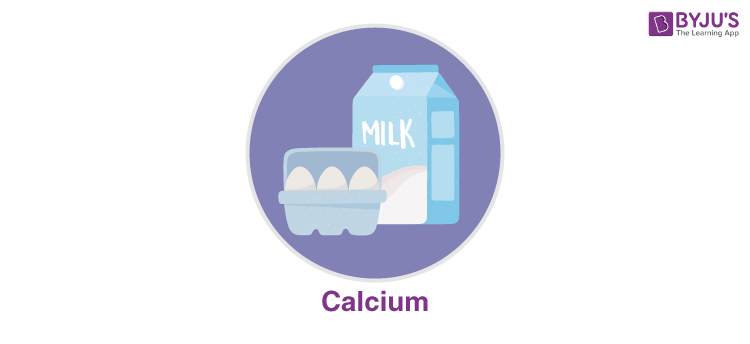
Calcium is the most abundantly found mineral in our body when compared to other minerals. It is an essential nutrient which is necessary for the development and maintenance of strong bones and teeth. It also helps in the normal functioning of the heart, nerves, muscles, and other body systems. Calcium’s role in bone formation takes place in a process called “bone mineralization”. The formation of bones is by the combination of the mineral complex – calcium phosphate, which provides more strength, structure, and density to the bones.
- Sources of Calcium: milk, yoghurt, cheese, green leafy vegetables, baked beans, soy milk, broccoli, cabbage, sapodilla, onions, sprouts, gooseberries, oranges, egg yolk, dried fish, etc.
- The function of Calcium: Calcium is the major and essential mineral for the growth of bones and teeth, for the regulation of enzyme activity and the formation of cell membranes. It is also involved in nerve conduction, muscle contraction, and exocytosis.
- Deficiency diseases of Calcium: The deficiency of calcium is mainly related to problems with blood circulation and other diseases like osteoporosis, dry skin, hypertension, cardiovascular disease, colon cancer, kidney stones, tooth decay, allergies, etc.
Comments